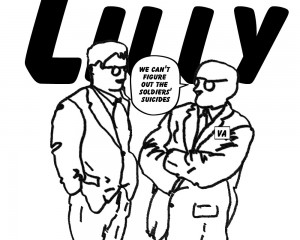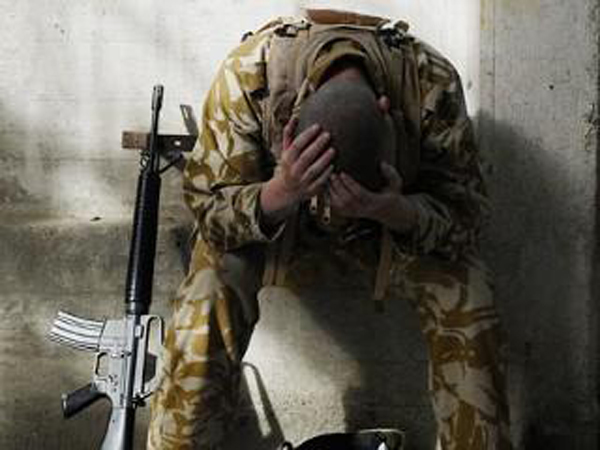OpEd News – November 14, 2014
By Martha Rosenberg
Once again, Pharma-subsidized consultants have looked at suicides in the military and managed to not see the suicide-linked drugs given to troops, some of which grew by 700 percent in the past years.
In March, a report in JAMA Psychiatry penned by authors with financial links to Eli Lilly, GlaxoSmithKline, Ortho-McNeil, Janssen, Pfizer, Sanofi-Aventis, Shire and Johnson & Johnson said the deaths are a mystery but they certainly aren’t from psychoactive drugs whose labels have boxed warnings about suicide! SSRI antidepressants are called “first line medications for PTSD pharmacotherapy in men and women with military-related PTSD” in the VA’s Iraq War Clinician Guide but did not merit a mention by the authors.
This week a JAMA Psychiatry study again seeks reasons for military suicides and ignores the elephant in the room. The study finds the strongest predictors of suicide are “sociodemographics,” like race, late age of enlistment, criminal offenses, prior suicide attempts and previous outpatient treatment or mental problems. Drugs whose labels have boxed warnings for “suicidal thinking and behavior” in “young adults”–the exact demographic being studied–were not a factor, according to the Pharma-friendly authors. If anyone doubts that money and Big Pharma have hijacked medical treatment and even medical information, consider this: visitors to the JAMA Psychiatry website trying to read the article will see an ad for the antipsychotic Latuda unless they pay. (Latuda also carries a boxed suicide warning.)
This week’s JAMA Psychiatry report is reminiscent of the Army’s 2010 “Health Promotion, Risk Reduction, Suicide Prevention” report which blames the economy, stress and troops’ risk-taking personalities including drug and alcohol use for the suicides. (“Illicit” drugs are cited 150 times.) Both this week’s report and the Army report seem like institutional exercises in passing the buck onto victims and their “pre-existing” problems.
They also insult the intelligence. Since more than a third of troops who kill themselves never deployed, the majority of those who did never saw combat and suicides are not falling since the wars’ ends, shouldn’t the role of widely-prescribed drugs that carry suicide warnings at least merit a mention as a factor or variable?
In a series called “Medicating the Military,” Military Times reports that one in six service members was on a psychoactive drug in 2010 and shows graphs of the suicide and prescription drug increases that exactly match.
 When it comes to Big Pharma and the military, there appear to be no firewalls. Matthew Friedman, executive director of the VA’s National Center for PTSD, unabashedly admits receiving AstraZeneca money in a video and served as a Pfizer Visiting Professor while helming a government organization. AstraZeneca makes Seroquel on which the VA spent $125.4 million in 2009 alone.
When it comes to Big Pharma and the military, there appear to be no firewalls. Matthew Friedman, executive director of the VA’s National Center for PTSD, unabashedly admits receiving AstraZeneca money in a video and served as a Pfizer Visiting Professor while helming a government organization. AstraZeneca makes Seroquel on which the VA spent $125.4 million in 2009 alone.
Elspeth Ritchie appeared in a webcast funded by AstraZeneca and Eli Lilly while serving in the U.S. Army Surgeon General’s Office and praised the drugs made by the companies.
Mark Hamner directed PTSD clinical care at Ralph H. Johnson VA Medical Center in Charleston, South Carolina while publishing AstraZeneca-funded research about . . . PTSD clinical care! What? Hamner lists 13 financial links to Big Pharma in an online course and Lori L. Davis of the Tuscaloosa VA Medical Center, with whom he worked, lists 16. (I explore these conflicts of interest in depth in my expose, Born with a Junk Food Deficiency.)
It is no secret that the military is one of Big Pharma’s last, reliable revenue streams. In just nine years, the VA spent $717 million on risperidone, the generic form of Risperdal, to treat PTSD in troops–even though it worked no better than placebo. Thanks, guys. I have personally interviewed military families who show me shoe boxesfull of drugs given to their family members for no clear reason and with no explanation. Some of the family members perished under the drug cocktails. The abuse of service members at the hands of Big Pharma is an underreported story and a national disgrace.
Also watch “Epidemic: Suicide” from CCHR’s The Hidden Enemy documentary:



SHARE YOUR STORY/COMMENT